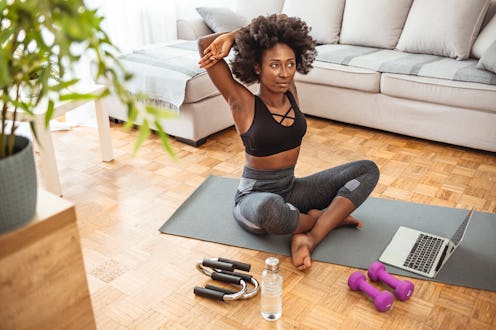Wellness
How To Start A Stretching Routine, According To Fitness Pros
Say goodbye to those tight hips and hammies.

Shutterstock
From improving your athletic performance to relieving stress, there are all kinds of reasons to get your stretch on. But... where to begin? To help, trainers share their tips for how to start a stretching routine.
Shutterstock
Define Your Goals
Start by figuring out why you want to stretch in the first place, says Hyfit head trainer Eli Poplinger. Is it to warm up or wind down from a workout? Or to counteract bad WFH posture? From there, you’ll be able to pick the stretches that work best for you.
Pyrosky/E+/Getty Images
Stretch Before Exercise
Poplinger suggests warming up with several minutes of dynamic stretches before working out. These active stretches release muscle tightness and boost circulation to improve flexibility, range of motion, and your ability to safely exert yourself.
Shutterstock
Stretch After Exercise
Static stretches, where you hold specific poses, are best after a workout to help you cool down and recover, says Poplinger. A good starting point? Target the muscles you worked during your activity to customize the stretch session to your body’s needs.
xijian/E+/Getty Images
Stretch To Reset
Stiff from sitting at your desk all day? Stretching can help, says barre3 trainer Lisa Schale-Drake. Without it, muscles become tight and weak, which can put you at risk for hurting yourself — so schedule daily stretch breaks to prevent those aches and pains.
Shutterstock
Take Baby Steps
If creating a stretching routine seems daunting, then start small, says Schale-Drake. Commit to just 3 to 5 minutes of stretching before and after your workouts to get into the habit, and then build from there. Your body will thank you.
Shutterstock
Stay Consistent
The best way to build a stretching routine is to stretch, well, routinely, says Schale-Drake. Regularly setting aside those few minutes a day will help your stretch sessions start to feel like second nature.
Tony Anderson/DigitalVision/Getty Images
Focus On Tight Muscles
Not sure where to begin? Pick stretches that target your tightest muscles, says Schale-Drake. Chest muscles, hip flexors, hamstrings, and calves are often the worst offenders from spending hours sitting hunched at your desk, she adds.
Shutterstock
Watch Your Form
Proper technique is crucial to getting the most out of your stretch session, says Poplinger. Consult with a fitness pro to help you master your form so you can avoid getting hurt and reap all the benefits of stretching.
Shutterstock
Pay Attention To Pain
Listen to your body when you stretch, says Poplinger. While a lengthening sensation is healthy, forcing yourself into positions or over-stretching to the point of discomfort can cause you to hurt yourself, he explains. Prioritize quality over quantity, so to speak.